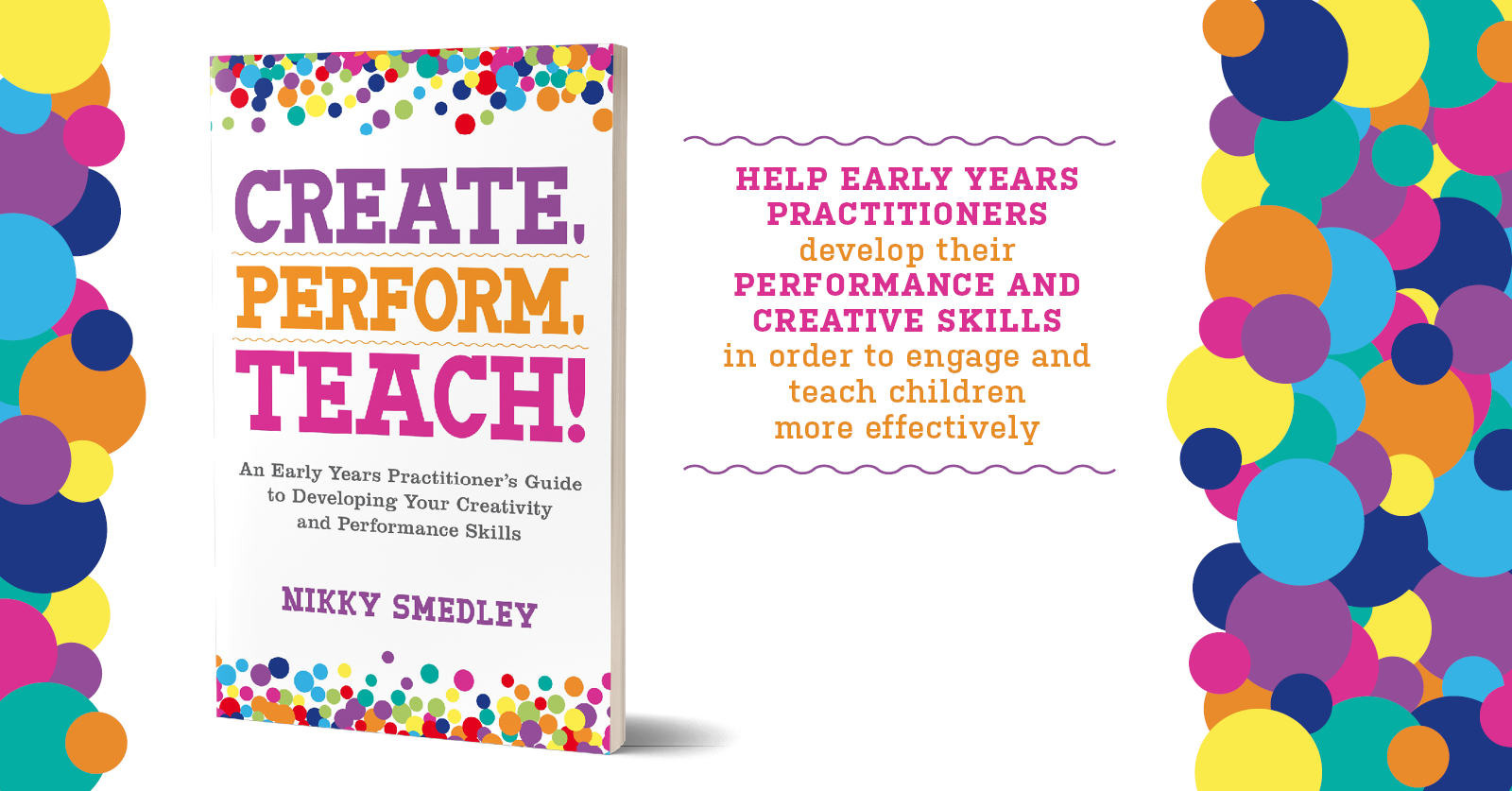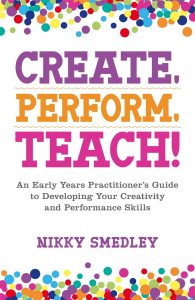
Nikky Smedley’s educational work is prolific. She has taught around Europe and the UK, focusing on vocational dance and theatre training, in EYFS, primary and secondary schools and special needs settings. Nikky holds two Digital Dance Awards, a Bonnie Bird New Choreography Award, is a BAFTA nominee – and a qualified Pilates instructor.
Nikky is a whirlwind of activity. She now works as an education consultant offering workshops on storytelling, performance and creativity. Oh, and she also played LaaLaa in Teletubbies for six years.
The following blog is by author Nikky Smedley on the subject of her new book, Create, Perform, Teach!
It was only a month or so after JKP and I decided on the book title that I realised it pretty much summed up my entire working life. I am passionate about these three things, and most passionate of all about the places where they conjoin.
My career started in theatre, music and dance, then I moved to children’s television and stage shows. When I crossed over to teaching, I was amazed at how many of the things I had learned as a performer and creator became not only useful to me, but an essential part of my repertoire in helping children learn.
I believe that the use of creative and performative techniques in any educational setting are important tools for engagement, but this is especially true in EYFS. However, in the midst of all the other skills the early years practitioner has to get under their belt before they are able to get out into the workplace, these two can be overlooked.
On top of which, creativity in particular has a slightly slippery rep. I can’t count the number of teachers I’ve come across who have told me they are ‘not creative at all’. In the main, I think this betrays a history of having been told they can’t dance, can’t sing, can’t draw or similar, and so have come to believe they have no skill in this area. NO! I say. Each and everyone one of us is a creative being in some shape or form. We may not have a talent for even a single one of what is traditionally construed as The Arts, but this does not mean we are not creative.
Every time there is a hard to reach child in class, or actually, every time you have to think of a way to more fully engage an easy to reach child, you are being creative. Working in EYFS more than any other setting, throws up communicative challenges, and it’s the creative part of your brain that has to solve these dilemmas.
In writing this book, I wanted to help practitioners recognise their own worth and potential in this field, to feel more confident and more comfortable with using these tools. So as well as giving practical suggestions, case studies and tips on storytelling, puppetry, music, movement and more, I wanted to keep the development of each and every one of us at the core. It’s all about how you grow and broaden your skillset, as well as what activities you can give to the children.
It’s not always particularly complicated. In my training sessions, an exercise I regularly use, is to ask everyone to work on their own to write a list of things they do in their spare time. Absolutely any interest, activity or source of enjoyment is acceptable. We then put the lists aside and work together as a group to draw up a list of areas from the EYFS Framework that the teachers are keen to concentrate on in their classes. Then we bring the personal lists back and work in pairs to apply the outside interest to the demands of the curriculum.
There can be some really wonderfully creative ideas. My favourite was a lady who attended weekly Flamenco classes, and suddenly realised that she had at her disposal a way of teaching counting that was engaging, multi-sensory, fun and effective. We all have elements of our lives that we’ve maybe not thought about using in our practice – for me, bringing Pilates exercise bands to nursery was a revelation! Try the exercise for yourself. Have a think about what other skills or party tricks you have up your sleeve that you can apply to your teaching. Performers draw on their entire personal toolkit to do the best job possible, and it’s a technique that really works in the classroom. Apart from anything else, it makes it a whole lot more fun.
At the end of the day, the more comfortable you feel with letting your own creative juices flow, the more you will be encouraging your children to do the same. The happier you feel with the performance aspects of your job – storytelling, leading movement sessions and so on – the more connection you will be able to make with your young audience.
I do believe that it’s a real privilege to be able to work with young children. They are incredibly important, and that’s why you are incredibly important. What you do in the theatre of your classroom is much more critical than just trying to please an adult audience. You work on the most important stage there is, so go create, perform, teach.
Nikky’s new book Create, Perform, Teach! is out now. Packed with tips and simple activities, her practical guide helps early years practitioners develop their creativity and performance skills to engage children more effectively. It includes advice on using storytelling, role play, sensory play, puppetry, nonverbal play, photography and much more. Find out more and buy the book from from our website.
If you would like to read more articles like this and get the latest news and offers on our early years books, why not join our mailing list? We can send information by email or post as you prefer. You may also be interested in liking our Special Ed, PSHE and Early Years Resources Facebook page.
